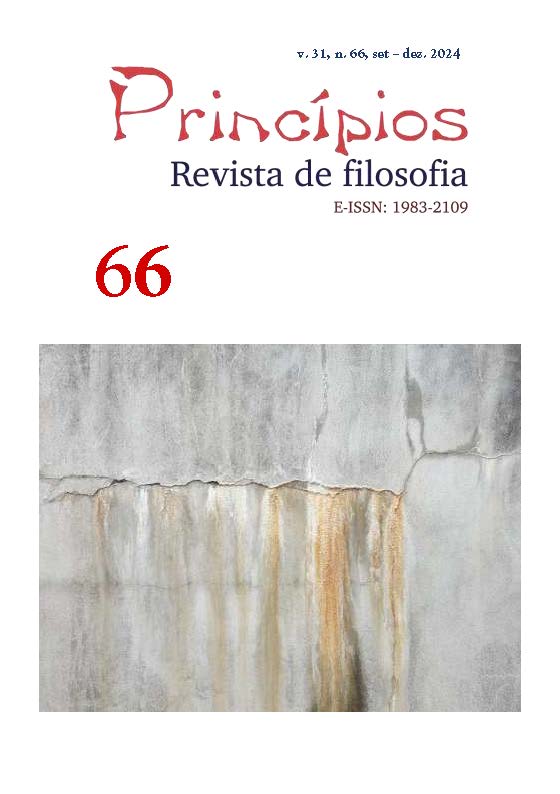dr. São Tomás de Aquino e a psicologia filosófica
sobre o método de investigação do primeiro princípio de vida
DOI:
https://doi.org/10.21680/1983-2109.2024v31n66ID36066Palabras clave:
Alma. Ciências Especulativas; Ciência Natural. Método. Propriedades. Psicologia.Resumen
Entre os muitos campos que a obra de São Tomás se estendeu para além da esfera teológica, um deles diz respeito à questão da divisão das ciências e os procedimentos investigativos empregados. Desta perspectiva, interessa-nos neste trabalho analisarmos o método que ele julgou adequado na investigação sobre a anima e, consequentemente, na psicologia filosófica que formulou. Inicialmente, o percurso intencionado consistirá na disposição do problema metodológico do ponto de vista mais amplo do seu contexto, isto é, a partir da discussão primária da classificação das Ciências Especulativas, conforme presente no Comentário ao Tratado da Trindade de Boécio. As observações deste opúsculo juvenil serão assimiladas àquelas do Comentário ao De Anima de Aristóteles, onde propriamente teremos a especificação das razões que instituem a psicologia filosófica no campo da Ciência Natural. Em prosseguimento, lidaremos com a temática da certeza epistêmica e modo de demonstração que pertence à psicologia filosófica; destacando, portanto, que a formulação de São Tomás mostra uma plena consciência de que a inacessibilidade direta do objeto há de ser elucidada por uma metodologia que partindo dos efeitos, manifestações e propriedades, seja capaz de inferir as causas e substância do primeiro princípio de vida.
Descargas
Citas
AQUINO, Tomás de. Comentário ao tratado da Trindade de Boécio: questões 5 e 6. Tradução e introdução de Carlos Arthur Ribeiro do Nascimento. São Paulo: UNESP, 1999.
AQUINO, Tomás de. Exposição sobre a Física de Aristóteles. Livro I, Lição1. Tradução de Carlos Arthur Ribeiro do Nascimento. 2018 (texto inédito cedido pelo tradutor).
AQUINAS, Thomas. Commentary on Aristotle’s de Anima: with Aristotle's de Anima in the version of William of Moerbeke. Transl. By Kenelm Foster and Silvester Humphries. New Haven: Yale University Press, 1965.
ARISTÓTELES. Sobre a alma. Tradução de Ana Maria Lóio. Lisboa: Imprensa Nacional-Casa da Moeda, 2010. vol. III, tomo I
.
DAVIES, Brian. The thought of Thomas Aquinas. Oxford: Clarendon press, 1992.
FESER, Edward. Aquinas: A begginer’s guide. Oxford: 2009, Oneworld Book.
FESER, Edward. The last supertition: a refutation of the new atheism. Indiana: Saint Augustine’s Press, 2008.
GARDEIL, Henri Dominique. Iniciação à filosofia de São Tomás de Aquino: psicologia e metafísica. E. ed. São Paulo: Paulus, 2013. vol. II.
GRANT, Edward. História da filosofia natural: do mundo antigo ao século XX. São Paulo: Madras, 2009.
KRETZMANN, Norman. Philosophy of mind. In: KRETZMANN, Norman; STUMP, Eleonore [ orgs.). The Cambridge Companion to Aquinas. New York: Cambridge University Press, 1993. (Col. Cambridge Companions).
PASNAU, Robert; Shields, Christopher. The philosophy of Aquinas. Colorado: Westivew Press, 2004,
NASCIMENTO, Carlos Arthur Ribeiro do. De Tomás de Aquino à Galileu. 2. ed. Campinas: UNICAMP/CFCH, 1998. (Coleção Trajetória, n. 2).
NASCIMENTO, Carlos Arthur Ribeiro do. Divisão e classificação das ciências segundo Santo Tomás de Aquino. Ágora Filosófica, ano 5, n.1, p. 23-29, 2005.
SWEENEY, J. Michael. Soul as substance and method in Thomas Aquinas’ anthropological writings. AHDLMA, v. 66, p. 143-187, 1999.
VAN STEENBERGHEN, Fernand. O tomismo. Tradução e prefácio de J. M. Crus Pontes. Lisboa: Grádiva, 1990.
ZUPKO, Jack. What is the science of the soul? a case study in the evolution of late medieval natural philosophy. Synthese, v.110, p. 297–334, 1997.
Descargas
Publicado
Cómo citar
Número
Sección
Licencia
Derechos de autor 2024 Marcos Roberto Nunes Costa, Rodrigo José de lima

Esta obra está bajo una licencia internacional Creative Commons Atribución-NoComercial-CompartirIgual 4.0.
Autores mantêm os direitos autorais e concedem à revista o direito de primeira publicação, com o trabalho simultaneamente licenciado sob a Licença Creative Commons Attribution que permite o compartilhamento do trabalho com reconhecimento da autoria e publicação inicial nesta revista.
Termos da licença:
| Não Comercial (NC) | Os licenciados podem copiar, distribuir, exibir e executar a obra e fazer trabalhos derivados dela, desde que sejam para fins não comerciais. |
| Compartilha Igual (SA) | Os licenciados devem distribuir obras derivadas somente sob uma licença idêntica à que governa a obra original ou menos restritiva. |


 Português (Brasil)
Português (Brasil) English
English Español (España)
Español (España) Français (Canada)
Français (Canada)


